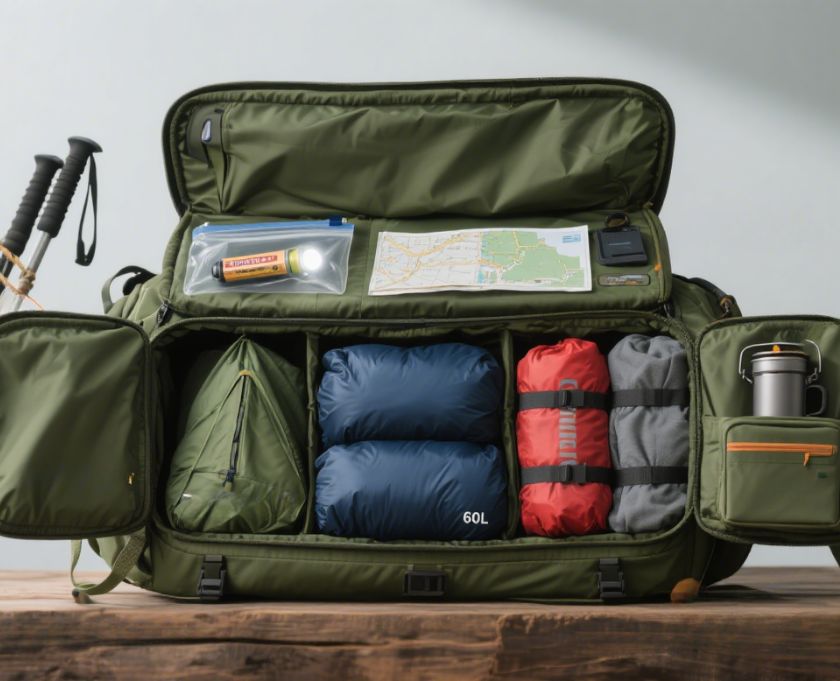Beautiful Plants For Your Interior

Packing can make or break a hiking trip. With the right hiking backpack packing efficiency tips, you can reduce strain, increase comfort, and carry everything you need without overloading.
The Golden Rules of Backpack Packing
Balance Between Comfort and Functionality
Pack so you can carry comfortably and access essentials quickly.
The Concept of Center of Gravity
Keep heavy items close to your back to maintain stability.
Pre-Packing Preparation
Make a Checklist of Essentials
Prevent overpacking by sticking to a list.
Choosing the Right Backpack Size
Match capacity to trip length and terrain.
Weather and Terrain Considerations
Cold weather or rough terrain may require more gear.
Efficient Packing Strategies
Layering System: Bottom, Middle, Top, and External Pockets
- Bottom: Sleeping bag and clothes
- Middle: Heavy items (food, cooking gear)
- Top: Frequently used items (jacket, snacks)
- External: Water bottles, maps, trekking poles
Heavy Items Placement for Balance
Keep dense gear centered and near your spine.
Compression and Packing Cubes
Save space and keep things organized.
Smart Use of Side Pockets and Straps
Store quick-access items like water, snacks, and rain gear.
Advanced Techniques for Weight Distribution
Keeping Center of Gravity Close to the Back
Reduces muscle fatigue on long hikes.
Using Hip Belts and Chest Straps
Transfers weight to stronger muscles.
Avoiding Overpacking
Carry only what you truly need.
Common Mistakes That Reduce Packing Efficiency
- Packing heavy items too low or too far from the back
- Ignoring weather-related gear needs
- Carrying duplicate items unnecessarily
- Forgetting to balance left and right sides
Packing Tips for Different Hiking Durations
Day Hikes
Use a 20–30L pack, keep it light.
Weekend Trips (1–3 Nights)
Opt for 35–50L, including compact camping gear.
Long Treks and Expeditions
65L+ with efficient packing systems.
Recommended Gear for Efficient Backpacking
Lightweight Sleeping Gear
Compact sleeping bags and inflatable pads.
Compact Cooking Equipment
Small stoves and nesting cookware sets.
Multi-Functional Clothing
Quick-dry, layered outfits that reduce packing needs.
Top 8 Hiking Backpacks for Packing Efficiency in 2025
- Osprey Atmos AG 65 — Anti-gravity suspension for comfort
- Deuter Aircontact Lite — Great ventilation + weight distribution
- Gregory Baltoro 65 — Durable, ergonomic design
- Arc’teryx Bora AR 63 — Premium material with weatherproofing
- The North Face Terra 55 — Affordable and versatile
- Thule Landmark 60 — Perfect for travel + hiking
- Patagonia Ascensionist 55 — Lightweight and minimalist
- Mark Ryden Pro Explorer — Urban-outdoor hybrid efficiency
Frequently Asked Questions (FAQs)
Q1: Should I pack clothes at the bottom?
A: Yes, place soft items like clothes and sleeping bags at the bottom.
Q2: How do I prevent my backpack from feeling unbalanced?
A: Place heavy items close to your back and centered.
Q3: Is a packing cube worth it?
A: Absolutely, they keep gear compact and easy to access.
Q4: How heavy should my hiking backpack be?
A: Ideally no more than 20–25% of your body weight.
Q5: Can I use one backpack for both day hikes and long treks?
A: Yes, a 40–50L pack with expandable capacity can work for both.
Conclusion: Hike Smarter with Packing Efficiency
By following these hiking backpack packing efficiency tips, you’ll achieve better comfort, organization, and energy conservation. The right packing method transforms your backpack from a burden into a reliable partner on every adventure.